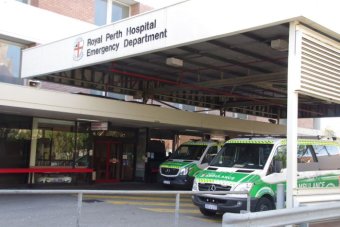
Dozens of mentally ill patients were kept in various Perth emergency departments for several days last financial year, new Health Department figures have revealed.
The figures, obtained by the West Australian Opposition, show 80 patients were held in EDs for three to four days, while some were held for up to six days.
The Australian Medical Association’s WA president, Michael Gannon, said the numbers were shocking and unacceptable, and proved the system was struggling to cater for mentally ill patients.
“The emergency departments are the interface between the health system and the sickest of mental health patients, for them to be sitting there for five or six days, it’s bad for everyone,” he said.
“It’s not the environment for them to get better, it’s sometimes unsafe for staff, it’s not right for people in an accident in an emergency department to be around out-of-control patients, this reflects inadequate capacity in the system.”
In a statement, Mental Health Minister Helen Morton defended keeping mental health patients in emergency departments for extended periods of time, saying some were physically ill.
“Patients with a mental illness may also have physical care needs that require specific assessment or treatment that require them to stay in an ED,” she said.
“For those patients presenting to a hospital emergency department with mental health care needs, the focus is on their being in a safe place while further assessment and treatment is determined.”
Dr Gannon scoffed at the Minister’s comments, saying there was no treatment that required someone to sit in an ED for three to six days.
“That’s absolute nonsense,” he said.
“This is an abrogation of their responsibility, and it’s yet another sign of a model which is increasingly flawed, where there is one minister for mental health and another for physical health.”
ED presentations increase by 50 per cent
The figures also revealed almost 48,000 patients presented at emergency departments across the state last financial year, an increase of nearly 50 per cent since 2010.
“What we have is a situation where the mental health system is in crisis, and the public hospital emergency departments sometimes bear the brunt of that,” Dr Gannon said.
“We’re talking about desperate people, we’re talking about desperate relatives, we’re talking about desperate GPs trying to get acutely unwell patients into beds, simply – there’s not enough acute mental health beds.”
Ms Morton said the Government remained committed to improving outcomes for mental health patients who presented in EDs with the development of new sub-acute facilities.
However, Opposition spokesman Stephen Dawson said the Government needed to do more to address the chronic bed shortage.
“If the beds are available, those numbers will drop, and people can actually access those mental health services that they need,” he said.
“We’re seeing far too many people having to wait in an emergency department because there are no beds available for mental health patients right around the state.”
